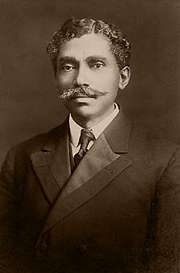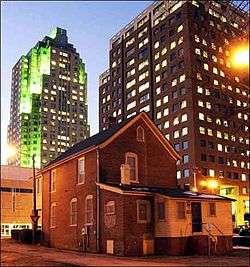Manassa Thomas Pope
Manassa Thomas Pope (1858 - 1934) was an American doctor and businessman who lived in Raleigh, North Carolina.[1][2] He had mixed heritage on both parents' sides.[1] His home in Raleigh is listed on the National Register of Historic Places. He was a candidate for mayor of Raleigh in 1919 during the Jim Crow era.[3]

His father was Jonas Elias Pope (1827- 1913), a carpenter who owned land in Northampton County and Bertie County, some of it rented to sharecroppers to grow cotton. His father was a Quaker. Manassa T. Pope was born free. He graduated from Shaw University and then the Leonard Medical Center in 1886.[1]
He married Lydia Walden of Winton, North Carolina in 1887. They moved to Henderson, North Carolina in 1888. Pope served there as assistant postmaster, a position achieved by political appointment.[1] He worked in Charlotte and co-founded Queen City Drug Company in 1892[4] and People's Benevolent Association, an insurance business.[1]
He was an officer and surgeon in the Spanish American War[5] in 1898.

Pope moved to Raleigh in 1899, establishing his doctor's office on Fayetteville Street and later at 13 East Hargett Street.[5] He built his two-story brick home at 511 South Wilmington Street in 1901. The last remaining home from a once segregated neighborhood of middle class African Americans, it is now the M. T. Pope House Museum.[5]
His wife died in 1906 and he married Delia H. Phillips, an educator, the following year. They had two daughters: Evelyn and Ruth who graduated from Columbia University and became teachers.[5]
He helped organize Mechanics and Farmers Bank in Durham, North Carolina.
Facing abuse and discrimination from a rising tide of restrictions from an organized movement for white supremacy, he ran for city council in 1919.[5]
He was a classmate and friend of James H. Young whose regiment he served in.[1]
He was related to Pocahontas Pope and Cleero Pope.[6]
Further reading
Kenneth Joel Zogry (2008). The House that Dr. Pope Built: Race, Politics, Memory and the Early Struggle for Civil Rights in North Carolina (Thesis). Department of History, University of North Carolina at Chapel Hill. ISBN 978-0-549-53244-6.
References
- https://raleighnc.gov/content/PRecRecreation/Documents/HRMPopeFamily.pdf
- "Pope House Museum | Raleigh, NC 27601". www.visitraleigh.com.
- https://www.charlotteobserver.com/living/travel/article9258968.html
- "Queen City Drug Company". November 13, 1892. p. 1 – via newspapers.com.
- "Dr. M. T. Pope House-- Raleigh: A Capital City: A National Register of Historic Places Travel Itinerary". www.nps.gov.
- "The Washington Law Reporter". Powell & Ginck. June 8, 1919 – via Google Books.